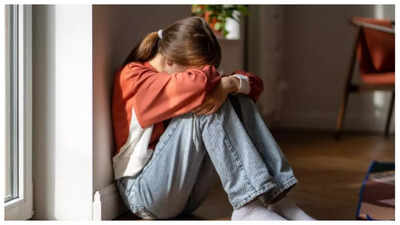
Depression is a debilitating mental disorder that is felt as persistent sadness and loss of interest in activities. It's more than just feeling down or an occasional "sad day"; it's a serious condition that can significantly impact daily life.
Most people think that only adults suffer from this condition, but studies indicate that a drastic percentage of students experience depression, with some research suggesting rates as high as 58.4%. However, identifying depression in kids can be tricky, as their symptoms might be different from adults. Let's dig deeper...Depression in Kids
It affects how children think, feel, and behave. Unlike normal mood swings (over school issues or home) or temporary sadness, depression interferes with a child’s daily activities, school, friendships, and family life. It can also cause physical symptoms like headaches or stomach aches without a clear cause.

Signs of Depression in Children
In children, depression might show up in different ways. Let's see howEmotional changes
Loss of interest: They may stop enjoying activities, (that they loved earlier) hobbies, or spending time with friends and family.Low self-esteem: Children might say things like “I am the worst” or “Nobody likes me”.Aggression: Younger kids may become more irritable or have frequent outbursts.Feelings of guilt: Your child might blame themselves for things or feel hopeless.Talking about death or self-harm: This is a serious sign that needs immediate attention.
Physical Symptoms
Changes in sleep patterns: Sleeping too much or having trouble sleeping.Changes in appetite or weight: Eating much more or less than usual.Headaches or stomach aches: Often without a medical cause.Lack of energy or fatigue: Your child may seem tired or “burned out” all the time.
Social Changes
Difficulty concentrating or making decisions: This can affect school performance, and even doing regular chores at home.Withdrawal from friends or family: Your child may isolate themselves or avoid social activities.Decline in school grades: Losing interest in schoolwork or sports. leading to poor grades.Risky behaviours in older children: Such as substance misuse or running away.Why early detection is key

What should parents do
Have a conversation
Start by gently talking to your child about how they feel. Provide them a safe space, and let them know it’s okay to share their feelings and that you are there to listen without judgment. Avoid blaming or minimizing their emotions. Sometimes children find it hard to put feelings into words, so be patient and supportive.
Observe their behavior
Note down any changes you see in your child’s mood, behaviour, sleep, appetite, or school performance.
This information will be helpful when you speak with healthcare professionals.
Seek help, professionally
If symptoms last more than two weeks or worsen, talk to your child’s doctor or a mental health professional. While you might want the best for your child, you are not qualified to help him. A therapist can assess your child, provide a diagnosis, and recommend treatment options like therapy or medication if needed.
Encourage Healthy Habits
Support your child in maintaining a regular routine with enough sleep, healthy meals, physical activity, and time for fun and relaxation.
These habits can improve mood and energy.
Watch for Warning Signs of Suicide
If your child talks about death, self-harm, or shows risky behaviour, seek immediate help from a doctor or mental health specialist. Do not leave your child alone if you fear they may harm themselves.
Sources:
KidsHealth – Childhood Depression: What Parents Need to Know Cleveland Clinic – Depression in Children: Causes, Symptoms & Treatment NHS – Depression in Children and Young People Johns Hopkins Medicine – Depression in Teens and Children

 11 hours ago
47
11 hours ago
47




























 English (US)
English (US)